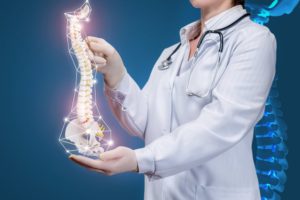
Many people start to experience some back and neck pain as they age. While some of this is to be expected, there are certain health conditions that can develop or worsen, like degenerative disc disease. As you age, the spinal discs that separate vertebrae and provide cushioning and support start to lose their elasticity and break down. Degenerative disc disease can occur due to a disc herniation or even make you more susceptible to bulging or herniated discs. Here’s what you need to know about what to avoid with degenerative disc disease and how to prevent it.
Symptoms of Degenerative Disc Disease
Degenerative disc disease can cause constant pain in your back near where the spinal discs have weakened. This kind of pain may be dull and throbbing or more severe and stabbing. Certain movements may make the pain get worse, or you might find that sitting or standing causes the pain symptoms to get worse. Certain sitting or sleeping positions may help decrease the pain temporarily. You can also experience pain and discomfort in your extremities are compressing nearby nerves. A herniated disc can cause pain, tingling, and numbness that radiates into the shoulder and arm or hip, buttock, and leg, depending on the location of the disc herniation.
What to Avoid with Degenerative Disc Disease
Here are four things to avoid to help with preventing degenerative disc disease.
Poor Posture
Poor posture can contribute to all sorts of spinal conditions and make your pain and other symptoms worse. When you are constantly sitting with your shoulders hunched or lifting things improperly, you can put too much stress and pressure on certain parts of the spine. This can also strain the muscles and ligaments that support your spine.
Soda & Alcohol
Soda has an ingredient called phosphoric acid that can end up negatively impacting your bone mass density, especially in women. Alcohol functions as a diuretic and can actually make your pain symptoms worse.
Smoking
Nicotine is also a diuretic and can increase the rate at which your spinal discs start to desiccate over time.
What to Focus on with Degenerative Disc Disease
Part of degenerative disc disease prevention is also about focusing on positive behaviors. Here are four examples of what you can do to help support a healthy spine and prevent complications like a disc herniation:
Stay Hydrated
Drinking water is a key element of staying hydrated throughout the day. Water helps bring nutrients to different parts of the body and also helps the spine, joints, and spinal discs function properly. You can also pair drinking enough water with making sure you get enough electrolytes that help your body fight dehydration.
Proper Lifting
Bending and lifting with your knees instead of your back helps to keep pressure off your spine and back muscles. Proper lifting techniques will help you avoid straining your back or causing a herniated disc.
Healthy Weight
Maintaining a healthy weight impacts your overall health, as well as your spine and joint health. When you are at a higher weight, the excess pounds can cause back problems and put more stress on your spine.
Physical Activity
Staying active also has a great impact on your overall health. Regularly engaging in stretches and exercises promotes flexibility and strength throughout the body. When you engage the muscles in your back, they are better able to support your spine.
Treatment Options for Degenerative Disc Disease
If you are dealing with degenerative disc disease or a disc herniation, then you are probably wondering what treatment options are available to you. The good news is there are many non-surgical treatment options to explore. Chiropractic care is an all-natural and noninvasive approach to spine conditions like degenerative disc disease. Physical therapy can help you learn stretches and exercises to help improve your flexibility and strength while also managing your pain. While degenerative disc disease is not reversible, there are many things you can do to help support your body and avoid further injuries and issues by working with a trusted spine doctor.
Visit AICA Orthopedics in Snellville to meet with spine doctors from a variety of specialties, including chiropractors, orthopedic doctors, and physical therapists, who work with you and provide a personalized treatment plan for your specific symptoms of degenerative disc disease.
